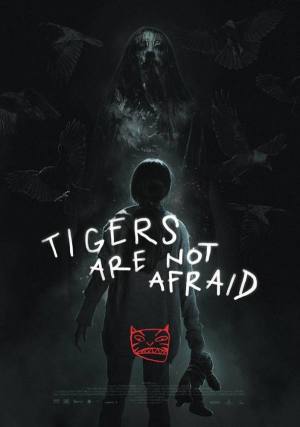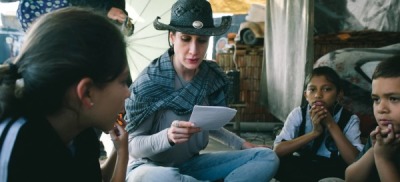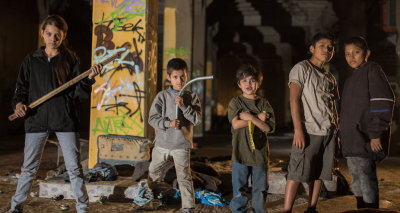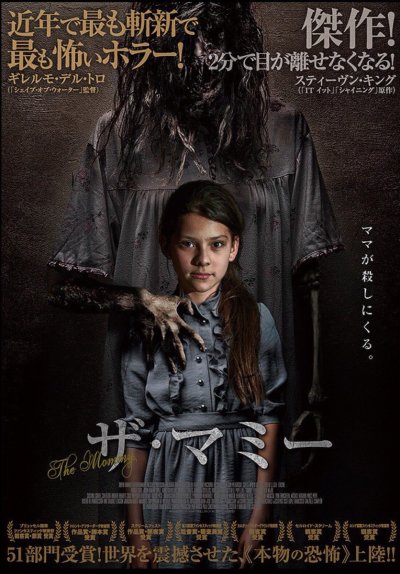
Photo by Myung J. Chun / Los Angeles Times
![]() BY DAN TABOR FILM CRITIC Tigers Are Not Afraid, which hits Philadelphia theaters next week, is a stunningly phantasmagorical Mexican horror/fantasy flick about a group of children who create a morose fairytale world to help cope with/explain the murder of their parents at the hands of the bloodthirsty drug cartels. This premise of abandoned Mexican children struggling to find hope in a world without is shockingly more relevant today than it was when I originally got to see it on the festival circuit back in 2017. The highest compliment I can pay Tigers is it feels plucked from the mind of a young Guillermo del Toro, bringing to mind such classics as Cronos and The Devil’s Backbone, two of my favorite films.
BY DAN TABOR FILM CRITIC Tigers Are Not Afraid, which hits Philadelphia theaters next week, is a stunningly phantasmagorical Mexican horror/fantasy flick about a group of children who create a morose fairytale world to help cope with/explain the murder of their parents at the hands of the bloodthirsty drug cartels. This premise of abandoned Mexican children struggling to find hope in a world without is shockingly more relevant today than it was when I originally got to see it on the festival circuit back in 2017. The highest compliment I can pay Tigers is it feels plucked from the mind of a young Guillermo del Toro, bringing to mind such classics as Cronos and The Devil’s Backbone, two of my favorite films.
I got to interview the film’s director Issa López last week in anticipation of the film’s release and she was able to not only give me some insight into the real-life tragedy that inspired the film as well as her methods for coaxing such convincing performances out of her young cast. Issa recently came to the US from Mexico where she started off as a writer on TV, eventually making her way into film as a writer/director. Primarily working in the comedy genre, Tigerswas her third feature and the first foray into the horror genre. It’s no surprise after checking out Tigersdel Toro himself not only personally endorsed Issa, but is also producing her next feature, which promises to be a werewolf western.
PHAWKER: First off, congrats on the release. What was the process like to get distribution for this film, since it feels like it’s been in limbo for the last couple of years?
ISSA LÓPEZ: Limbo, it feels like it from the outside. Especially if you caught it at the very birth at Fantastic Fest. Really, it’s been three years, almost to the date and then you think, ‘what the hell?’ So, there’s an explanation. In order to be financed, we had to presell the distribution rights in the US to a company that bought packages of Latin American comedies. I can perfectly imagine them opening their box of oranges and finding an avocado there. They were like “uggghhhhh”, which is what we were expecting, for them to go ‘we aren’t going to distribute this.’
But then the movie started to get the beautiful reactions, and support of the champions like [Guillermo] del Toro and Neil Gaiman and Stephen King. Then the distribution company was not as eager to let it go. So, then negotiations, to be able to get it to Shudder was ENDLESS and painful. Many, many times, I thought it was done and it was not going to happen, but Shudder would not let go, amazingly and it took three years and here we are.
PHAWKER: The film has a lot to say about trauma and how people deal with it, where did this story come from?
ISSA LÓPEZ: Uhhhhh….. from trauma, completely. [laughs] I lost my mother when I was eight years-old, of course the circumstances of that were a lot more civilized than of the cartels in the film. My mother died of natural causes, but the thing is I basically came home from school and I never got to say good-bye. That affected me deeply and that need for closure is always with you, and there’s always a feeling as if a ghost is walking with you. So, the movie is a very belated way of telling that story.
It also happened, I wrote it while I was going through a huge personal crisis. I had moved to the US to make movies and that did not happen. I then lost my day job, as a writer and a writing doctor, I went through a breakup, I put down my dog, my father died, it was, everything went wrong. Sometimes you do need to hit rock bottom to search yourself out and then you need to do something you believe in and that I am the master of. That’s where the script for Tigers happened.
It’s completely honest. It comes from a very raw, very fragile place and I think that’s the response we had, is because it feels and it comes across, as honest and vulnerable. It talks about a thing that worries me and pains me deeply, which is the very real situation that children in Mexico are going through. Children are obviously in many warzones around the world and now in the US, because it’s crazy now we’re getting raids by I.C.E and they are taking the parents and leaving the children in the streets. I find it horrible that the movie, is evermore current now than when it was 3 years ago. Things have not only not  gotten better, but they have gotten worse with the situation with cages along the border. It’s really, really fucked up.
gotten better, but they have gotten worse with the situation with cages along the border. It’s really, really fucked up.
PHAWKER: With Trump and the internment camps that would make an equally terrifying sequel.
ISSA LÓPEZ: It’s funny you should say that. I am not talking about that, but its funny you should say that.
PHAWKER: The film has become even more relevant having sat on the shelf because you have those issues now on both sides of the border.
ISSA LÓPEZ: Completely, completely, completely. It’s vital to understand why are these children crossing the border? Why are their parents taking them through such a dangerous journey? It’s to escape a situation as dire as the situation Tigers is portraying. It’s vital to understand, to turn a case this massive into people with names, and stories, you know.
PHAWKER: I read you originally sent out to make a film about the drug trade film in Mexico, how did you decide to turn that into a fantasy/horror film?
ISSA LÓPEZ: That movie about the origin of the cartels during World War II fell apart. It was part of the crisis that I was going through when I wrote Tigers.
PHAWKER: Cartels during World War II? That sounds fascinating.
ISSA LÓPEZ: It does doesn’t it? But nobody wanted to put their money into it. So, it was the true story of how the cartels were born. It has to do with foreign policies of the US during World War II and I wrote that story, but it was a period drama, nobody wants to do those. So nobody wanted to put money into it, if say we didn’t have Ryan Gosling on the lead. So, I spent a year chasing the Ryan Goslings of the world and it’s pretty heartbreaking. So rather than talk about the origin, talk about the results and that is how Tigers happened.
Along the way I was talking to historians and sociologists about that part of history, because that particular corner of Mexican American history and one of them in passing said how bad it is along the border and then of course there is the problem of the  children left on their own. I had never given it any thought and I felt terrible. Back then then this was before the internment camps, no one was even thinking about children involved with this and part why nobody was doing that is because Cartels have become like the bad guys in Bond movies to, Narcos. There is this romanticizing of that violence and that fear, but nobody is talking about the children affected by it. I felt that someone had to and that is what Tigers is.
children left on their own. I had never given it any thought and I felt terrible. Back then then this was before the internment camps, no one was even thinking about children involved with this and part why nobody was doing that is because Cartels have become like the bad guys in Bond movies to, Narcos. There is this romanticizing of that violence and that fear, but nobody is talking about the children affected by it. I felt that someone had to and that is what Tigers is.
PHAWKER: Speaking of children, they are notoriously hard to work with. But the cast her is pretty amazing and they just do a great job at bringing the audience into their world. What was the casting process like her and how did you manage to get these performances?
ISSA LÓPEZ: The casting was tremendous, I knew that if I wanted to make this world believable and very, very real I needed the performances that gave back. It had to feel like these things being these things are happening for real. So, we did and old fashioned casting call and my casting director showed something like 600 children. I personally saw 200. Then we cut down to 100, down to 50, down to 20, down to 5. It was around four to five months of casting to find these guys.
Then once we had them, what I was looking for was kids with as little professional experience as possible as actors as I could find, because I didn’t want performances, that felt like performances. I wanted that to feel real, like it really happened. Technique was going to get in the way, what I was looking for other than a certain look was a certain energy. So withEl Shine what I wanted was this mask of resentment, that at the same time had the strength to be the father figure for these other children and it turned out to be that he was the shortest of the gang. But he has this power and for Estrella I wanted someone that had a lot of presence when they are quiet because she doesn’t have many lines, but she observes the world; she is our eyes throughout the story.
I was looking for certain energies and once I found them I put them together and we worked for a month in the relationships  between them, in creating this workshop where the mechanics of what you see was created in the real relationships to take it to the screen. I did enlist the help of an amazing teacher named Maria Fatima Toledo who worked with the children on City of God, which was you know, a huge influence for the movie. She was able to clean performances and not have the children go into acting and she worked for a couple of weeks with them in prep and left.
between them, in creating this workshop where the mechanics of what you see was created in the real relationships to take it to the screen. I did enlist the help of an amazing teacher named Maria Fatima Toledo who worked with the children on City of God, which was you know, a huge influence for the movie. She was able to clean performances and not have the children go into acting and she worked for a couple of weeks with them in prep and left.
Finally, that prep helped me to create a relationship of trust with them. Where they would feel in an emotional place where they could open up and they knew that there was no judgment and that I was there to go through the emotions with them. Where these kids go you have to be with them; it’s some scary and very dark emotions, so you have to go and be there with them and bring them out. I was exhausted at the end of the shooting. Outside it was very beautiful, it was happy, but I was very tired.
PHAWKER: Finally, why do you think we are so terrified by fairytales and they still resonate with and terrify us?
ISSA LÓPEZ: Because if you go to the original fairy tales, the original text, that was told by word to mouth for generations before that, they are really horror stories. You know they are so dark. Most of them are really, really scary. We have kind of domesticated them, and we made them nice and we painted them with pastel colors, but they are beastly, beastly scary stories. They are cautionary stories, and they are moralist stories, and they are stories that are designed to make us not lose faith. That the hero goes through a certain amount of tasks and tests, he is going to come out on the other side triumphant and conquering the challenges and the monsters. It gives a little bit of sense in this confusing world ours.
So they are going to be powerful, and we want to listen to them. I think that when we are honest about them and we go to the dark side of them, they are ever so more appealing. We are never ceased to be drawn in by them, because we want to believe that we can get wishes when we blow candles, we want to believe that rules and laws of the fairy tales apply to the real world and the bad guys get what is coming their way. We want to believe it, so we will always believe in fairy tales.
